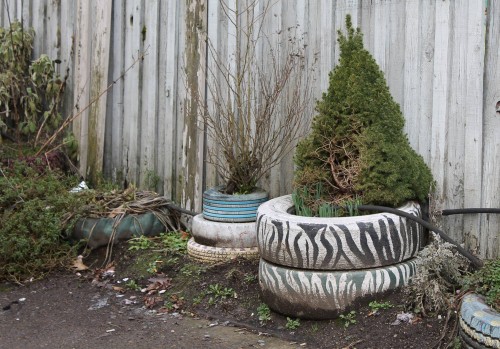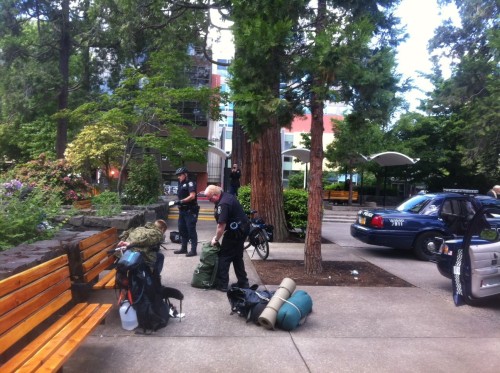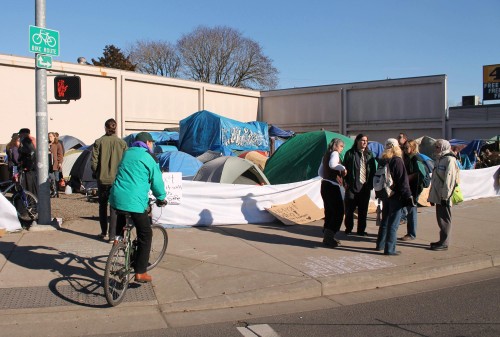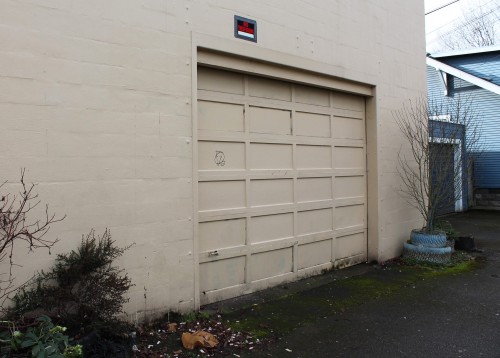“I’m in a lot of pain right now,” Daisy said to me quietly.
I wasn’t sure exactly what type of pain she was referring to at that moment. For as long as I have known Daisy, which is going on six years now, she has lived a life of constant pain, both physical as well as psychological. She was sober and alert at the moment, which led me to think that she was referring to her arthritis as opposed to her inner trauma and emotional turmoil.
“But I’m still a fighter,” she added with a smile.
The fact that she was a fighter was undisputed in my mind. Daisy has been on the streets of this town for an untold number of years, with a notable portion of that time spent either stumbling through various stages of intoxication or stumbling through various stages of the criminal justice system. Despite the tragedy and trauma of her everyday life, however, her spirit was anything but broken. She is one of many chronically homeless individuals in downtown Eugene who the police refer to as “frequent flyers” due to the frequent amount of times that they are arrested and released for minor offenses directly related to homelessness and/or addiction. Rarely can you find a business owner or resident in the downtown area who isn’t familiar with Daisy, and unfortunately much of that familiarity falls with the context of negative interactions that often result in police intervention. This has resulted in her being banned from entering several local businesses, which further affects her stabilization and well being. For anyone on the street, but especially for someone like Daisy, a lack of access to public establishments means lack of access to quality food and other survival necessities, which triggers stress, which then triggers behavioral issues, which results in another episode, which results in yet another exclusion and/or trip to jail, and so on and so forth. It’s a tragic cycle, one that is seemingly impossible to break under the current conditions and limitations of the system.

The alleyway behind my building, where I have often found Daisy asleep.
Much like the business owners and residents, the police hold a variety of emotions and attitudes regarding Daisy that range from compassion to frustration to contempt. In my many conversations over the past few years with allies in the police department, it has been made clear to me that they are quite aware that constantly arresting, jailing, and prosecuting Daisy and others like her for the “crime” of being a chronically homeless alcoholic is neither effective nor sensible, not to mention a huge waste of taxpayer money. And yet they stress that they have “no other tools in the toolbox” in terms of methods of dealing with people like Daisy, and I sympathize and agree with them on this point. Their training prepared them to be law enforcement officers, not social workers or crisis intervention counselors, and their duty to uphold the law often requires that they treat Daisy as a criminal in situations that they acknowledge would be much more effectively handled by trained crisis intervention workers as opposed to law enforcement.
I’ve gotten to know Daisy pretty well over the years. I’ve experienced her many moods and phases, and while I understand and sympathize with the frustration and anger that police and businesses often feel towards Daisy, I have quite the soft spot in my heart for her. I’ve gotten to know sides of Daisy that most have never experienced. I’ve interacted with sober Daisy, happy Daisy, worried Daisy. She’s told me jokes that made me laugh until I cried, and she’s told me stories about her life that have simply made me cry. I see Daisy as a person, not a “problem” or “nuisance”, and its impossible for me to every be truly angry with her despite often wanting to scream in hopeless frustration. I refuse to blame or condemn her, and I’ve been known to intervene when others feel they have the right to do so. At the end of the day, I feel nothing but sympathy and love and compassion for Daisy.
Many argue that such an approach and attitude is akin to “enabling”, but I don’t love and accept (and often defend) Daisy as she is because I approve of or condone her behavior. I love and accept and defend Daisy as she is because I recognize her beauty and worth as an individual despite her flaws and I strongly believe that she deserves a better life, even and especially when she does not always believe so herself. Daisy’s behavioral history and current condition is the result of a complex combination of medical, social, psychological, and economic factors, not a personal moral failing on her part as many would believe. It’s been said that a society is judged by how we treat our most vulnerable. In my eyes, Daisy’s situation signifies a society that has failed in this regard, and as a result of that failure so many people are systematically marginalized, condemned, alienated, and stripped of their dignity.
More than anything else, at the very, very least Daisy deserves to be treated with dignity. No matter how intoxicated, how angry, or how unmanageable she can be, she is a human being who has had a tougher life than most of us could possibly imagine, and regardless of her past or present challenges, Daisy is as worthy and sacred and divine as any and all of us are. She may not be able to “work” to earn her keep in her current state, but that does not mean she does not have value as a person and as a member of our community. She deserves respect and dignity, and she deserves a warm, safe place to sleep at night. All human beings need and deserve a place to sleep.
It has been said that the definition of insanity is repeating the same action over and over again and expecting different results. Under that definition, the city’s approach to handling Daisy over the years is completely insane. It’s recognized on both a local and national level that criminalizing addiction as well as criminalizing life-sustaining behaviors is a dead-end to nowhere in terms of effectiveness, and Daisy’s situation perfectly demonstrates the utter failure of a criminalization-based approach. Police acknowledge that more than anything else, Daisy and others like her need a place to sleep and supportive services, not endless rounds through the criminal justice system. But sadly, the only dry and legal place to sleep that Daisy regularly experiences is a bed inside a jail cell.

Police in the process of arresting a homeless individual for public consumption.
The city’s approach regarding Daisy and the other “frequent flyers” is not only logically insane, but it’s a prime example of financial insanity as well. Estimates can vary widely, and such costs are deliberately not itemized, but its been whispered in many corners of city government and the social service sector that some of the frequent flyers cost the taxpayers upwards of $100,000 per person, per year. The majority of these costs, which usually consist of numerous trips to the police station, the jail, the emergency room, the psych ward, and the detox facility, are directly related to living on the street without shelter options, and most of these costs could be greatly reduced by adopting the “Housing First” (http://en.wikipedia.org/wiki/Housing_First) model for chronically homeless individuals like Daisy as opposed to criminalizing their existence. In states and cities that have implemented Housing First, the cost-savings has been significant, one example being a stunning 2/3 reduction in costs per-person in Colorado. And while city officials are open and eager to adopting such practices in Eugene, the funding is currently not available on either a local or state level. In the meantime, for over a decade now Daisy and so many others have had no other option than to live on the streets.
For the past few months, however, Daisy has been living at an unsanctioned tent city at the edge of the downtown district known as Whoville. The Whoville camp is a self-governed, community-funded project that has been providing sanctuary for as many as 50 people at a time on a 4,000 square foot public lot since late September. Whoville functions as a collaborative effort between those who were living on the streets and members of the community who are able and willing to provide support: activists, non-profits, church groups, and concerned citizens alike. Whoville currently provides a safe place to sleep, regular access to bathrooms and handwashing stations, access to healthy food and a place to cook it, and a strong network of community support from and for a wide range of people from all walks of life. In many ways, the Whoville population is a perfect microcosm of the homeless population as a whole. Whoville residents range from the recently unemployed to the permanently disabled, from those simply down on their luck to those who suffer from addictions or severe mental illnesses. There are people at Whoville who have only been homeless for a few months, and others who have been homeless for a significant portion of their lives.

The Whoville camp as seen from the street.
To be fair, the formation of Whoville in itself arguably falls under the above-referenced definition of insanity. For over thirty years, camping laws have been regularly enforced throughout the City of Eugene, with little to no tolerance of tent communities of any kind. Both history and common sense suggest that any tent community that is formed on public land in Eugene would be disbanded by police, without exception. And yet, in the midst of an immediate crisis in which some of the most vulnerable members of our community had nowhere to go, a public tent city seemed to be the only option. Desperation often leads to insane thinking, and granted we were desperate. But we also knew from past experience, street folks and activists alike, that even though camp would certainly be shut down, that it was what happens within such a camp while it exists that often holds more power than the inevitability fate of the camp itself, which provided the motivation to go forth despite what seemed to be a foregone conclusion.
And so Whoville was formed, and it grew, and it was supported. It grew some more, and it gained more support. The camp moved around from parcel to parcel for five weeks, then strategically decided to stand their ground at a vacant public lot just outside of downtown. And over the course of four months, Whoville relationship with both the police and the community at large went from adversarial to cooperative. Local opposition morphed into wary but gradual and steady public acceptance. As Whoville grew, downtown business owners noticed that less people were sleeping in doorways, in parks, in alleyways. There were fewer behavioral issues downtown, fewer incidents related to disorderly conduct, fewer calls to the police department. Some of the frequent flyers had all but vanished from downtown.
For years, activists and advocates as well as the homeless population itself has consistently approached the city with a very simple and sensible message: If you don’t want downtown full of frequent flyers and other subpopulations that are experiencing the realities and effects of homelessness, give them somewhere else to go. If you’re going to tell people where they can’t be, you need to tell them where they can be. People exist, they are made of matter, they do not have the ability to disappear or vanish at will, they have bodily needs and survival needs that cannot be ignored, and they need a place where they can legally exist.
This concept has seemingly fallen on deaf ears for years, as the city continued its policies of criminalizing their existence with the insane hope that one day the homeless will just disappear or go somewhere else. But Whoville, acting on the belief that survival and dignity are more important than ordinances and citations and therefore worth fighting for, has demonstrated and proved that having a place to be not only results in the relocation of those who formerly had nowhere to be other than downtown street corners, but it has also demonstrated to the community that by providing such a place, even the most challenging members of the street population can stabilize to an extent. Not only have behavioral issues reduced, but the corresponding costs to the public of dealing with such issues have been reduced as well. Echoing the results of the Housing First model, the “frequent flyers” at Whoville have needed far fewer law enforcement interventions or emergency services than they had while living on the streets, a fact which has been noted by both police and social service providers. It’s a testament to the fact that while sheltering individuals indoors is obviously preferable, even an outdoor space where they have a place to exist and stabilize within a community results in both instant as well as long-term benefits as opposed to leaving people on the street with nowhere to go.
Even more important than the economic benefits, however, is the transformation and healing that has occurred for many in the Whoville community through the course of its existence. In the time since she has been at Whoville, the improvements in Daisy that myself and others have witnessed has been nothing short of remarkable. The day she whispered to me about her pain, I had stopped by Whoville early in the evening, and it was obvious that she had been sober all day. She was alert, she had a healthy skin tone, and other than her pain issues, Daisy was more upbeat and even-tempered than I had ever witnessed in all the years that I’ve known her. She was functioning within a community, as part of a family, being taken care of, and trying to take care of herself as well. When she reminded me that she was a fighter, it literally brought me to tears. For so long, I had dreamed for something better, anything better for Daisy than what I had been witnessing for years. And finally, she had somewhere to be, was a part of a community, and was taking steps on the road to healing. For Daisy and many others, the community brings a sense of acceptance and belonging that is an essential component of anyone’s well being. I can point to many individual factors that have been an improvement in Daisy’s life as a result of Whoville, but the most powerful factor that I’ve witnessed in the improvement of many here is the power of community itself, both the internal community of Whoville residents and the outer community that supports them.

Formerly a favorite “frequent flyer” hangout, with much less foot traffic as of late.
Ironically, I was walking past an area near my building a few weeks ago and had paused at a spot where I would often find Daisy in the past when I received a text message from my primary contact at the police department, requesting a meeting later in the afternoon. I knew immediately that I was about to be informed of the City’s intent to evict Whoville. Despite everything the community had provided and demonstrated over a period of four months, the City’s response would be no different: send them packing with nowhere legal for them to go and act as if they’ll just disappear. The meeting confirmed my expectations down to the smallest details. No alternate campsites would be opened. No emergency shelter of any kind would be provided. The camp would be evicted sometime in the immediate future with no alternate arrangements made and no real consideration given to the fact that some of the Whoville residents desperately needed supportive services and were not able to adequately care for themselves on their own.
I’ve often observed that the primary narrative concerning the issue of homelessness in this community is dominated by two vocal minorities: the homeless themselves and those who advocate for and support them, and those who believe that the homeless people are all “lazy bums” who are only looking for a “handout”. Often lost in this polarized atmosphere are the sentiments and feelings of the general public as a whole. Both sides of the debate will often claim “public support” for their position, but both sides are arguably equally speculative in those assertions. There is a lot of compassion in this community, but there is also a lot of ignorance.
But this time, while voices obviously rose loudly from within and around Whoville in opposition to the city’s plans, an entire separate chorus of voices also rose up against the plan – the voices of the general public. After four months, people in all corners of the community had recognized the value of Whoville, and many made their opposition to the closure known through social media, letters to the editor, as well as statements sent directly to the City Council. Other influential parties also chimed in, notably Occupy Medical and the city’s Human Rights Commission, speaking out in opposition to dispersing 40 people with nowhere safe for them to go. For the first time, public sentiment seemed to be truly understanding of the idea that if we force people to leave, we must give them somewhere else to be.
And under pressure from many directions, public officials responded, and last Wednesday the City Council granted Whoville a 30-day reprieve while viable alternatives can be explored. While the decision does not guarantee that there will be a place for Whoville to relocate a month from now, it is a decision based on the recognition that pushing people out with nowhere for them to go is neither humane nor sensible, nor does serve any legitimate purpose. Its also a recognition of the fact that Whoville is meeting a vital community need that has gone unmet due to holes in the social safety net, and that the stabilization and healing that people are experiencing at Whoville is a benefit to the community as a whole. Many are starting to recognize that the segment of the street population that the city has deemed ‘unmanageable’ can often function quite well with the right kind of community support. The decision gives the community an opportunity to face this issue for what it truly is and to come forward with actual solutions. For once, an attempt at a common-sense approach is being attempted as a resolution, as opposed to the usual bureaucratic insanity that has been the status quo for years.
It’s a simple idea, really, the idea that someone who has been systematically marginalized and abandoned will show consistent improvement if and when someone shows them a little love and kindness. For someone like Daisy, the results have been nothing short of miraculous. We speak of “community” often, but I find that the word is so often used in a hollow sense, devoid of any real substance, and the true meaning and of community has either been forgotten or has never understood by so many. Whoville is a testament to the potential power and effectiveness of solidarity and horizontal collaboration as practiced in a community setting. United in the belief that everyone should be treated with respect and dignity, Whoville offers stability and sanctuary to those who have been all but forgotten, and their ability to self-govern and support each other is an example to us all.
Each of us is sacred and worthy, and we all deserve support and safety. And while its long-term future is still up in the air, if a society is judged by how it treats its most vulnerable, let Whoville be a beacon of light that guides others towards the right path.
(*Author’s Note: Daisy’s name and a few minor details have been changed for privacy reasons.)
The Wild Hunt is not responsible for links to external content.
To join a conversation on this post:
Visit our The Wild Hunt subreddit! Point your favorite browser to https://www.reddit.com/r/The_Wild_Hunt_News/, then click “JOIN”. Make sure to click the bell, too, to be notified of new articles posted to our subreddit.

My opinion only: This is a very complex problem. Many of these people are victims of American style child abuse, caused by a number of factors. One of the causes Unresolved parental trauma and stress is often visited on children, in rates that far outstrip other developed countries. If you ever wondered why we spend over ONE TRILLION dollars per year on the “defense” industry and are the most warlike violent nation on earth. Look no further.
Those who aren’t permanently disabled by a traumatic childhood
(which from what I have read is 1 in 4 kids in the US)
can grow up to project the anger of that trauma onto helpless victims, like the poor, the homeless,animals, liberals, “gays”, jews, wiccans.. hell most of us are on the list.
Certain religions I won’t name certainly make a point of deflecting hopelessness and helplessness that people feel onto scapegoats instead of where the anger belongs..(perhaps at the banks that caused the current recession would be a nice start?)
To make matter worse, certain legislators seem intent on feeding that anger and call for cutting food stamps, help to the homeless and “entitlement programs”.
(BTW did you know T3ed Cruz’s wife was a VP at Goldman Sachs?)
Many of these homeless people are victims of the society they live in and are discarded like trash..They are the “cost of doing business” in a “free market”. Just like Iraqi kids dying is the cost of “democracy”.
How much are we willing to lie to ourselves about the kind of society we live in?
Again JUST My opinion ,our violence and inability to take care of our own people is fueled by the cycle of child abuse and certainly economic hierarchy…Okay I will shut up now..
As she said, Doing the same thing over and over but expecting different result is a sign of insanity. Yes society can be insane just like any individual. Sometimes something causing you trouble merely means doing something different.
Whoville is an example of doing something different, let those those that want to help to help, giving the homeless a place to stay of their own and to form their own community, for the healing affects that only a supportive community can create.
Find a permanent place for them to live within walking distance of town, and as Whoville has shown you will have less problems for business owners, less use of the police force, less people in jail, less time tying up the courts, and less cost for the taxpayers. Sounds win/win to me.
Alley, Thank you.